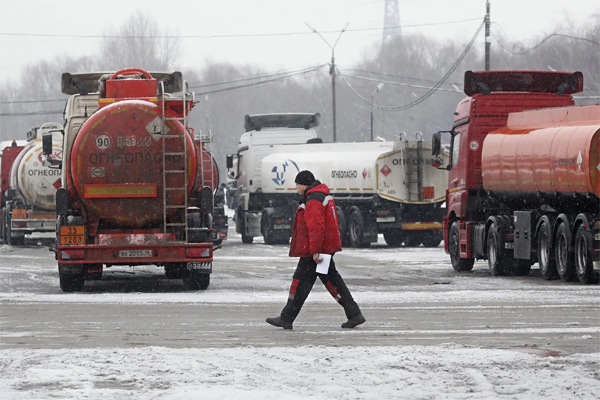The coming ban on Russian exports of refined oil products could strain energy markets and crimp Russia’s output.

Stanley Reed
LONDON
Energiesnet.com 02 02 2023
On Sunday, two months after the European Union banned most crude oil from Russia, the bloc will expand the embargo to Russian supplies of diesel and gasoline, the lifeblood of transportation.
The escalation is aimed at further throttling Russia’s energy business, cutting it off from its most important export market. Sales of petroleum products are crucial for financing the country’s budget and, ultimately, its war in Ukraine. The West is hoping to slowly diminish this source of money for the Kremlin.
“Russia lost by far its most important client,” said Fatih Birol, executive director of the International Energy Agency, in an interview.
But the coming shutdown of Russian fuel creates risks for motorists and truckers in Europe, who could face shortages and higher prices for diesel. While Europe has, so far, pulled off the embargo on Russian crude oil with little disruption since it started on Dec. 5, there are fears that the ban on refined products like diesel may not be so smooth. Prices for European diesel futures have already been rising.
“I think the implementation of this one may be more challenging,” Mr. Birol said.
Diesel fuel is critical to Europe’s economy, powering not only trucks delivering goods but also more than 40 percent of cars in the European Union. Last year, Russia supplied about half of Europe’s diesel imports, around 700,000 barrels a day. These volumes may be hard to quickly replace, and in recent weeks European refiners have been preparing by building up their reserves.
“The pinch point is seen very much as being diesel,” said David Fyfe, chief economist at Argus Media, a commodities research firm.

Russia’s war in Ukraine and the Western reaction to it have already prompted sweeping shifts in global energy supply lines for crude oil and for natural gas. The coming ban on Russian petroleum products is expected to put the energy industry through yet another set of contortions.
“What is likely to happen is one big giant reshuffle,” said Hédi Grati, an executive director for refining and marketing at S&P Global, a financial services firm. Mr. Grati and other analysts say Europe will need to bring more diesel and other petroleum products from growing refining powers like Saudi Arabia, Kuwait and the United Arab Emirates in the Middle East as well as India, China and the United States.
There are signs that this shift is already underway, with countries like France and Germany reducing their purchases of Russian diesel, Mr. Grati said. “Those countries are preparing for the divorce,” he added.
This rebalancing, which is only just beginning, will almost certainly cause strains that force prices higher, analysts say. For one thing, longer distances for shipping diesel will mean that larger vessels will be needed to bring products to Europe, and longer shipping times will add to costs.
There could also be a mismatch of fuels. Russian refiners may try to sell diesel made for Europe to places where a higher concentration of pollutants is permitted, like West Africa, analysts say, while European energy companies will need to look harder for sufficient high-specification fuels that local regulations require.
Diesel supplies may be squeezed in other ways. With China’s economy likely to begin heating up thanks to the easing of Covid-19 restrictions, refineries there and elsewhere in Asia may shift to making jet fuel at the expense of diesel, reducing the amount of diesel available to send to Europe.
The hindrances on Russia may mean it is not able sell all its output. That could mean less diesel fuel in the global market, further crimping supplies that have been tight for months.
“Prices of all products will have to push higher,” said Richard Bronze, head of geopolitics at Energy Aspects, a research firm. “Europe is going to feel that particularly strongly.”
Already, overall Russian diesel exports have dropped sharply in recent days, said Viktor Katona, an analyst at Kpler, a firm that tracks energy shipping. Mr. Katona also said ships laden with diesel had headed from Russia to Morocco in recent weeks. Their cargo, he said, could be reexported to Spain or other Mediterranean destinations.
In a final wild card, the European Union, the Group of 7 nations and their allies will seek to limit the amount of revenue that Russia can earn from its refined oil products by setting a price cap, much as they did for Russian crude in December. Western shippers and insurers will be permitted to handle only those Russian refined products sold under specified price levels that have yet to be announced.

In Europe, there is not expected to be a shortfall of diesel and other oil products when the embargo begins; reserves provide at least a short-term buffer. The question is more how the interplay of complex factors like China’s demand, the weather and Europe’s economy plays out over the ensuing months, people in the industry say.
“There is unlikely to be an immediate shock,” said Dev Sanyal, chief executive of Varo Energy, a Swiss company with refining interests. “The market will have time to digest, and the market will have time to react.”
Still, the closely watched difference between the price of a barrel of diesel and a barrel of oil is more than $40 — well above what is considered normal, though not as high as at times last year. Truckers and motorists are also paying high costs at the pump. In Britain, diesel costs about 15 percent more than unleaded gasoline, compared with an average of about 3 percent in 2021.
“This is the Achilles’ heel of Europe right now,” said Mr. Katona of Kpler. “Europe will pay up for diesel; it will buy it from somewhere.”
Russia, too, will probably be hit by the embargo. While Moscow has so far managed to find new customers for crude in India, Turkey and other countries, there may be limits to those tactics.
Once the embargo on refined products kicks in, Russia will be probably be shut out of more than half the markets for its oil and petroleum products that it had in 2021, in terms of volume. And it may be more difficult for Russia to persuade India, which has stepped up its buying of Russian crude, to do the same for refined products, an area where it is self-sufficient.
“Russia can’t simply send diesel to Asia the way it has been able to with crude,” said Mr. Bronze of Energy Aspects.

To sell crude to a narrowing set of markets, Russian companies have provided hefty discounts to compensate for the added costs of longer shipping distances and to compete against established suppliers to Asian markets like Saudi Arabia and Iraq. Russia has also had to develop a new set of business relationships with unfamiliar traders, who are driving hard bargains.
“If you are a Russian exporter, you are having to go much further away,” said Craig Kennedy, a former investment banker specializing in Russia and now an associate at the Davis Center for Russian and Eurasian Studies at Harvard. “You are going to have to offer a really compelling price.”
While Russia’s exports held up better than analysts expected in 2022, the low prices began cutting into its revenues late in the year. In December, Russia earned an estimated $12.6 billion from oil, a drop of about 24 percent from a year earlier, according to the International Energy Agency. That same month, Russia’s gas export earnings dropped by about a quarter, to $10 billion. Both Europe and Russia are paying a high cost for this energy war.
Stanley Reed has been writing from London for The Times since 2012 on energy, the environment and the Middle East. Before that he was London bureau chief for BusinessWeek magazine. @stanleyreed12
nytimes.com 02 01 2023












